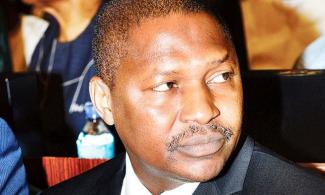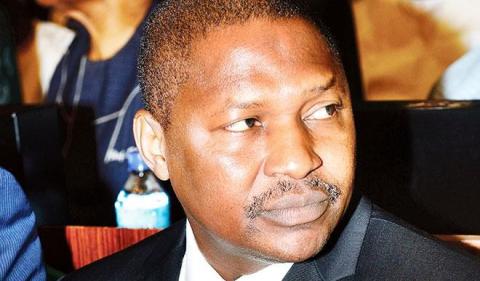
Three foreign anti-corruption bodies and their Nigerian affiliate have expressed suspicion that Mr. Abubakar Malami, the Attorney-General of the Federation (AGF) to renegotiate the tainted sale of the lucrative oil block (OPL 245) with Mr. Dan Etete, former Petroleum Minister, and others if the price is right.
The fraudulent acquisition of OPL 245 by Mr. Etete's Malabu Oil and Gas Limited in the 90s has been described as one of the biggest crimes against Nigerian people as well as being subject of numerous corruption cases locally and internationally, including by the Economic and Financial Crimes Commission (EFCC), which has charged Mr. Etete and Mr Mohammed Bello Adoke, immediate past AGF, and others to court.
The four anti-graft bodies, Global Witness, The Corner House, Re: Common and Human Environmental Development Agenda (HEDA) raised the suspicion in a jointly signed letter addressed to the AGF.
The letter questioned the fidelity of Mr. Malami's letter of 27 September 2017 to President Muhammadu Buhari in respect of OPL 245.
In the letter to the President, the anti-graft bodies noted, the AGF argued that there is insufficient evidence to support charges brought by the EFCC against Messrs Adoke, Etete and others for corruption-related offenses related to the acquisition of the OPL 245 by Shell and Italian firm, Eni.

The groups equally recalled that Mr. Malami described the OPL 245 Resolution Agreement, one of three interlocked agreements that enabled the deal, as “sacrosanct”, arguing that its clauses preclude prosecution of Shell or Eni officials.
"We find it impossible to reconcile the above positions with recent documents submitted by Nigeria to the UK Commercial Court in support of Nigeria's successful application to repatriate the OPL 245 funds that were frozen, at the request of the Milan magistrate, in London," said the anti-graft groups. They also referred the AGF to statements made by the Federal Government, on his instructions, in relation to Mr Etete and the Resolution Agreements in court documents used in the UK proceedings.
On Mr Etete, the groups noted that paragraph 4 of the Federal Government's statement of claims stated thus:“Malabu received funds as a direct result of corrupt acts performed by the mind, management and controlling will of the defendant Chief Dan Etete ['Etete'], the former Minister of Petroleum Resources, who by entering into a corrupt arrangement with an oil consortium was able to obtain in excess of $1billion.”
They equally observed that in paragraphs 44-55, the Federal Government stated in elaborate detail the “unlawful and
criminal offences” committed by Mr Etete in relation to OPL 245.
“Etete's conduct in the use of Malabu as a front for his activities breached the Code of Conduct for Public Officials,” the Nigerian government stated explicitly.
As regards the Resolution Agreements, the anti-corruption organizations said in paragraph 29, the Nigerian government described the Resolution Agreements, signed on 29 April 2011), as “a corrupt arrangement.”
Paragraph 30 of the Resolution Agreements, quoted the Nigerian government as saying: "The April 29th Agreement reflected a conspiracy to injure the claimant [Nigeria] by unlawful means by depriving the claimant of monies for the grant of OPL 245 to which it was lawfully and exclusively entitled”.
In the next paragraph, the Nigerian government described the agreement as an arrangement, which served to conceal the diversion from Nigeria of the purchase price for the OPL 245 ". . . paid for by the joint purchasers, Eni Spa and Royal Dutch Shell Plc to the Malabu”.
Paragraph 40, headlined "Unconstitutional and Corrupt Agreement", Nigerian government's statement of claims states thus: "The mechanisms by which the payments were made was unlawful as being contrary to the claimant's constitution."
Similarly noted by the groups was that in paragraph 59, the Nigerian government quoted an extensive passage from the judgment of Mr. Edis J. in respect of Malabu vs the Director of Public Prosecutions.
In the judgment, Mr Edis described the Resolution Agreements as having “an aura of corruption”.
According to the groups, It was on the strength of these claims that Nigeria was successful in the persuading the UK
courts of its case. The effort resulted in the eventual repatriation of $73 million (about N2 billion) for the benefit of the Nigerian people.
While stating that they have enormous respect for the AGF's office, the groups stated that they had no other option than to be frontal in their expression of dismay at the glaring inconsistencies between the case argued by Nigeria the in the UK courts and Mr. Malami's letter to President Buhari.
"We simply fail to understand how there could be no case for Mr. Etete and others to answer in Nigeria when the Federal Republic of Nigeria (FRN) has sought redress in a court in the UK on the explicit basis that Mr Etete’s actions were 'corrupt'; unlawful' and; criminal'. We also note that Mr. Etete, Shell, Eni, senior Shell and Eni executives and others are being prosecuted in Milan.
"We are similarly dumbfounded that you should have argued to the President that the Resolution Agreement with Shell and Eni is 'sacrosanct' when the FRN’s lawyers (acting on your behalf) have described the said agreement as “unconstitutional”, “corrupt” and “a
conspiracy” to defraud Nigeria," said the groups.
They added that they were bound to Mr conclude that Mr. Malami's letter to the President had been misunderstood by them or that the UK courts were misinformed.
The anti-graft bodies, therefore, requested that, as a matter of urgency, Mr. Malami should provide a clarification of his position. They also requested that he should confirm that the statement made by the Nigerian government in its UK claim remains a true statement of the position of Nigeria and that there was nothing in his letter to President Buhari that should be taken as meaning the contrary.
The AGF was given up to March 1 to respond but defaulted.read as to the contrary. The groups disclosed that Mr. Malami's letter to the President is causing enormous harm in anti-corruption circles internationally.
"We understand the need to reassure investors that contracts will be respected. But we know of no jurisdiction where corrupt contracts are valid. Indeed, far from being reassured by the stance you have apparently taken, many investors will be appalled. On the face of it, your letter (when taken together with the FRN’s pleadings in the UK court) suggests that Nigeria’s Chief Law Office is willing to renegotiate tainted contracts, provided the price is right," said the groups.
The letter, which was copied to President Buhari, Vice President Yemi Osinbajo and the Presidential Advisory Committee Against Corruption was signed by Messrs. Nicholas Hilliard of The Corner House, Luca Manes of Re: Common, Olanrewaju Suraju of HEDA and Simon Taylor of Global Witness.